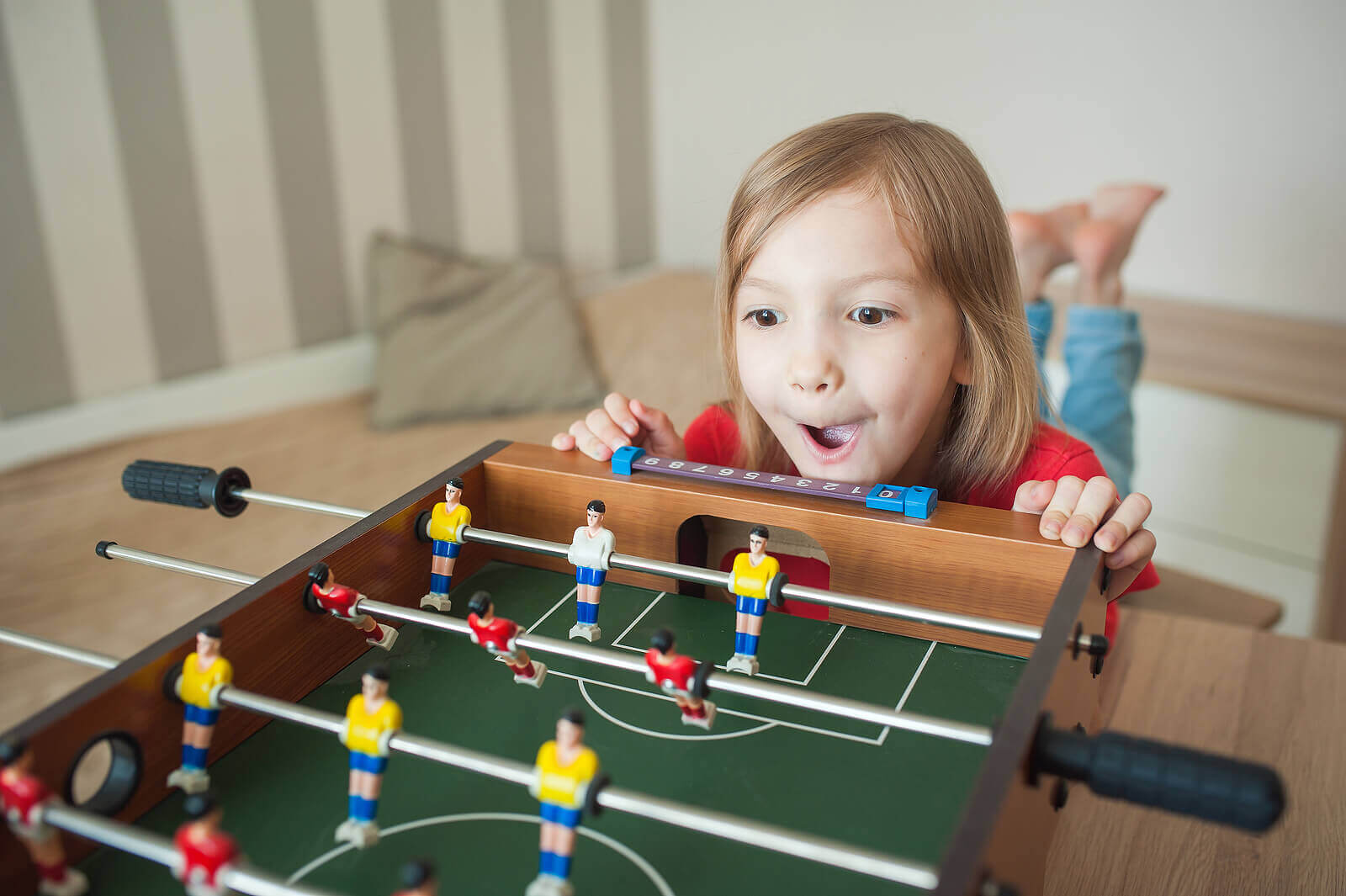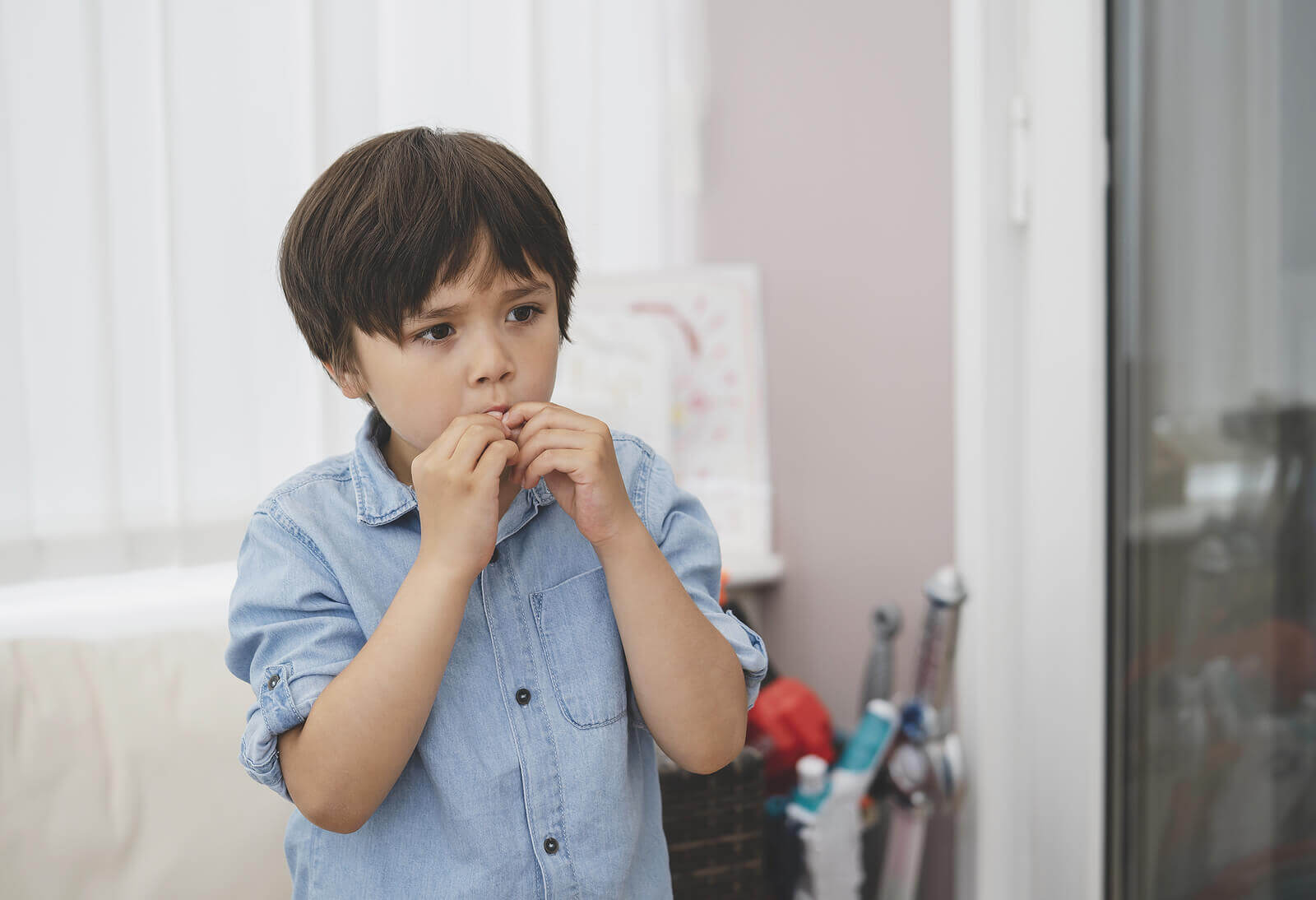Understanding Children's Impulsive Behavior

Most children do or say things without thinking about the consequences of their actions. Mistakenly, we often perceive impulsive children as spoiled, careless or rude. Below, we’ll talk about children’s impulsive behavior and how we can help our children gain self-control.
Children sometimes find it very difficult to put a stop to their minds. They interrupt you while you’re talking to someone and they take things without asking for permission. They may even put themselves in danger, for example, by crossing the street without looking to chase a ball, etc.
Impulsive children often act before they can stop themselves. As a result, as parents, we wonder why they act this way – whether it’s immaturity, recklessness, etc. – and how we can help them.
What does impulsive behavior in children look like?
When a child is impulsive, from time to time, we may think that it’s something common in the little ones. However, the perception changes if we observe impulsive behaviors on a frequent basis. This is because we notice they may have a hard time controlling themselves.

Not all children have the same impulsive behaviors. These behaviors manifest themselves differently in each child and, moreover, may change as they grow older. Some of the behaviors we can observe are:
- Taking things away from other people.
- Being unable to wait their turn in conversations or games.
- Doing inappropriate things in order to get attention.
- Having a hard time following rules consistently.
- Being aggressive with other children – biting, kicking or hitting them.
- Always wanting to be first.
- Not understanding that their words and behaviors can affect others.
- Overreacting to mistakes, criticism and frustration.
- Not understanding that their actions have consequences.
Children’s impulsive behavior can make them seem younger than they are. S0, you may see behaviors in a 10-year-old child that resemble those of a 6-year-old. That’s because their self-control hasn’t matured.
What can cause children’s impulsive behavior?
There are several reasons why a child may be impulsive. Let’s look at some of the reasons that may be responsible for such impulsiveness.
Immaturity
Children behave this way because they mature later than other children their age. As a result, this delays their development of the ability to stop and think before they act.
Stress, frustration and lack of sleep
If children are having problems at school or in the family, impulsivity can be a way to release that tension. We mustn’t forget that children don’t know how to express their emotions as adults do. Therefore, they release that tension through impulsive behaviors.
Children with ADHD, one of the causes of impulsive behavior
Children with attention-deficit hyperactivity disorder (ADHD) have difficulties, especially in controlling certain intense emotions, such as anger. As a result of this incapacity to regulate their emotions, children may also have a hard time controlling their behaviors.
Phobias and mood disorders
Some mood disorders can also be the reason behind impulsive behaviors in children. Regardless of the reason our child has this type of behavior, it’s important that we support them, and help them improve and gain more self-confidence. This will help them feel more mature and have higher self-esteem.
How can we help our children if they’re impulsive?
To help our children, the first thing we should do is observe how they behave at home. This will give us an idea of why they have such difficulty in controlling themselves.

It’s key that we identify the reason for these impulsive behaviors in order to use the appropriate tools to address them. If the problem is frustration, we can use a frustration log to observe patterns over time. This will help you discuss the issue at school and with professionals so that, together, you can find the solution.
If you think or know that the reason is that your child has ADHD, then it’s best to ask for an evaluation at school. This will help you guide your child to where they need to direct their efforts to find a solution. Still, there are some strategies that you can employ regardless of the reason behind your little one’s impulsive behavior, such as:
- Techniques to improve self-control.
- Responding with empathy when your child is frustrated.
- Practice impulse-control skills.
Many times, children realize that their behaviors can be a problem, and this affects them. For this reason, it’s important that we let them know that they’re not the only ones having difficulties and that, with practice, they’ll develop better self-control. Never forget to celebrate their achievements as they gain control of themselves.
In the end, as you’ve seen, children’s impulsive behavior can be due to several reasons and the above causes are only a few examples. Each child is unique and special. By simply practicing self-control skills, your child’s impulsive behavior will gradually decrease.
As parents, we’re our children’s guides and role models. Therefore, always show empathy and celebrate each one of their successes. Doing so will make their self-esteem stronger.
Most children do or say things without thinking about the consequences of their actions. Mistakenly, we often perceive impulsive children as spoiled, careless or rude. Below, we’ll talk about children’s impulsive behavior and how we can help our children gain self-control.
Children sometimes find it very difficult to put a stop to their minds. They interrupt you while you’re talking to someone and they take things without asking for permission. They may even put themselves in danger, for example, by crossing the street without looking to chase a ball, etc.
Impulsive children often act before they can stop themselves. As a result, as parents, we wonder why they act this way – whether it’s immaturity, recklessness, etc. – and how we can help them.
What does impulsive behavior in children look like?
When a child is impulsive, from time to time, we may think that it’s something common in the little ones. However, the perception changes if we observe impulsive behaviors on a frequent basis. This is because we notice they may have a hard time controlling themselves.

Not all children have the same impulsive behaviors. These behaviors manifest themselves differently in each child and, moreover, may change as they grow older. Some of the behaviors we can observe are:
- Taking things away from other people.
- Being unable to wait their turn in conversations or games.
- Doing inappropriate things in order to get attention.
- Having a hard time following rules consistently.
- Being aggressive with other children – biting, kicking or hitting them.
- Always wanting to be first.
- Not understanding that their words and behaviors can affect others.
- Overreacting to mistakes, criticism and frustration.
- Not understanding that their actions have consequences.
Children’s impulsive behavior can make them seem younger than they are. S0, you may see behaviors in a 10-year-old child that resemble those of a 6-year-old. That’s because their self-control hasn’t matured.
What can cause children’s impulsive behavior?
There are several reasons why a child may be impulsive. Let’s look at some of the reasons that may be responsible for such impulsiveness.
Immaturity
Children behave this way because they mature later than other children their age. As a result, this delays their development of the ability to stop and think before they act.
Stress, frustration and lack of sleep
If children are having problems at school or in the family, impulsivity can be a way to release that tension. We mustn’t forget that children don’t know how to express their emotions as adults do. Therefore, they release that tension through impulsive behaviors.
Children with ADHD, one of the causes of impulsive behavior
Children with attention-deficit hyperactivity disorder (ADHD) have difficulties, especially in controlling certain intense emotions, such as anger. As a result of this incapacity to regulate their emotions, children may also have a hard time controlling their behaviors.
Phobias and mood disorders
Some mood disorders can also be the reason behind impulsive behaviors in children. Regardless of the reason our child has this type of behavior, it’s important that we support them, and help them improve and gain more self-confidence. This will help them feel more mature and have higher self-esteem.
How can we help our children if they’re impulsive?
To help our children, the first thing we should do is observe how they behave at home. This will give us an idea of why they have such difficulty in controlling themselves.

It’s key that we identify the reason for these impulsive behaviors in order to use the appropriate tools to address them. If the problem is frustration, we can use a frustration log to observe patterns over time. This will help you discuss the issue at school and with professionals so that, together, you can find the solution.
If you think or know that the reason is that your child has ADHD, then it’s best to ask for an evaluation at school. This will help you guide your child to where they need to direct their efforts to find a solution. Still, there are some strategies that you can employ regardless of the reason behind your little one’s impulsive behavior, such as:
- Techniques to improve self-control.
- Responding with empathy when your child is frustrated.
- Practice impulse-control skills.
Many times, children realize that their behaviors can be a problem, and this affects them. For this reason, it’s important that we let them know that they’re not the only ones having difficulties and that, with practice, they’ll develop better self-control. Never forget to celebrate their achievements as they gain control of themselves.
In the end, as you’ve seen, children’s impulsive behavior can be due to several reasons and the above causes are only a few examples. Each child is unique and special. By simply practicing self-control skills, your child’s impulsive behavior will gradually decrease.
As parents, we’re our children’s guides and role models. Therefore, always show empathy and celebrate each one of their successes. Doing so will make their self-esteem stronger.
All cited sources were thoroughly reviewed by our team to ensure their quality, reliability, currency, and validity. The bibliography of this article was considered reliable and of academic or scientific accuracy.
- Miranda, A. y M. J. Presentación. (1997): Intervención psicoeducativa con los alumnos inatentos, impulsivos e hiperactivos y dificultades de aprendizaje”, Barcelona, ED. Librería Universitaria de Barcelona.
- Barkley, R.A. (1995): Niños hiperactivos. Cómo comprender y atender sus necesidades especiales, Barcelona: Paidós.
This text is provided for informational purposes only and does not replace consultation with a professional. If in doubt, consult your specialist.








